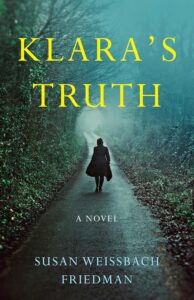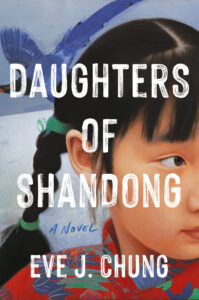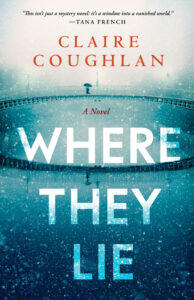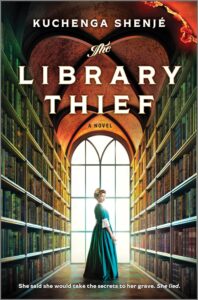New Voices: Claire Coughlan, Eve J. Chung, Kuchenga Shenjé & Susan Weissbach
WRITTEN BY MYFANWY COOK
Claire Coughlan, Eve J. Chung, Kuchenga Shenjé & Susan Weissbach combine a love of excavating facts and desire to convey explanations about their characters’ lives to provide readers with innovative glimpses into the past.
 A little over ten years ago, Susan Weissbach, author of Klara’s Truth (She Writes Press, 2024), was “journaling about the experience of psychotherapy as both a psychotherapist myself, and as someone who has been in psychotherapy,” she says. “Although the profession strongly recommends this, I know I would have found my way there one way or another. Through my writing I began to think of deep-seated memories as similar to buried artifacts, which need to be handled with great care during the excavation or unearthing process.
A little over ten years ago, Susan Weissbach, author of Klara’s Truth (She Writes Press, 2024), was “journaling about the experience of psychotherapy as both a psychotherapist myself, and as someone who has been in psychotherapy,” she says. “Although the profession strongly recommends this, I know I would have found my way there one way or another. Through my writing I began to think of deep-seated memories as similar to buried artifacts, which need to be handled with great care during the excavation or unearthing process.
“In this way, the psychotherapist is like an archaeologist, I thought, gently going more deeply into old or childhood memory in tandem with the client, to then incorporate those memories into the present. I more recently learned that the well-known psychoanalyst Sigmund Freud spoke about analysis in this way, and was quite interested in actual artifacts himself.”
She is “not a Freudian,” she continues, “but I do think this concept is spot on. Thus, my main character, Professor Klara Lieberman, was born, and I was writing a book called “Artifacts – A Novel,” in which Klara could connect with thousand-year-old artifacts from past Mesoamerican cultures more easily than with her own life, as it was much safer to do so.”
Her main protagonist is Klara, “a 49-year-old professor of archaeology co-leading a Yucatán dig, with few emotional or social attachments in her life. Two things then happen. First, she becomes acquainted with a wise Mayan healer, Rosario, who asks her, ‘Why are you so interested in everyone else’s culture? What about your own?’ Second, she receives a letter from her 82-year-old estranged mother in New York, telling her the truth about her long-ago-disappeared father—that he’s buried in Warsaw and that the Polish government is now giving financial reparations to the families of Holocaust survivors whose land was stolen under Nazi rule. Although her mother urges her to fly to Warsaw right away, Klara decides to do so for her own reasons—to meet her late father’s family.”
Klara’s visit to Poland enables her connect with her extended family, but also opens up her mind and her heart towards an inviting new future.
 For Eve J. Chung, “before Daughters of Shandong (Berkley, 2024) became a book, it was a Band-Aid. The impetus for this novel came from a simple desire to record a family history, one that had been partially lost because I had taken time, and life itself, for granted.”
For Eve J. Chung, “before Daughters of Shandong (Berkley, 2024) became a book, it was a Band-Aid. The impetus for this novel came from a simple desire to record a family history, one that had been partially lost because I had taken time, and life itself, for granted.”
Chung’s grandmother was in and out of hospitals for a year before she died, but it had never occurred to Chung to interview her. “It felt unlucky to do so—like I would be giving up on her. I wish that I had understood then the importance of preserving her memories, the closest thing that any of us have to immortality.
“Many years after my grandmother’s death, I was with my mother and my children in Seattle. My daughter had recently turned one, and I regretted that neither of my children would meet my grandmother, who had helped raise me—my grandmother had often spoken about how she hoped to become a great-grandmother, and how excited she was to meet my children.”
Chung explains, “That Seattle trip was the first time that my mom and I sat together and spoke in detail about my grandmother’s journey from China to Taiwan. I had always known that my grandmother and her mother and sisters had been left behind by the rest of their family during the Chinese Civil War, but was astonished by the sheer distance of this journey, which spanned thousands of miles. My great-grandmother had bound feet, but took her daughters by foot through rugged terrain to escape persecution, bluffing and begging along the way. When I told my mom that I was going to write down this story, she offered to pay for its publication. Neither of us thought that it would become a novel, which would eventually get me an agent and a book deal. Much of Daughters of Shandong had to be filled in through research, but the heart of the story remains as it was—one of a woman and three girls who not only survived, but thrived despite horrific circumstances. I am honored to be able share this story with readers around the world.”
 Claire Coughlan’s debut thriller Where They Lie (Harper Perennial/Simon & Schuster UK, 2024) was prompted in part by what “Stephen King says in On Writing: that good ideas occur when ‘two previously unrelated ideas come together and make something new. This began to resonate with me when I completed an MA in Creative Writing at University College Dublin in 2009. One of the modules I took was called Archive of the Imagination, taught by the acclaimed writer (in both the English and Irish languages), Éilís Ní Dhuibhne.
Claire Coughlan’s debut thriller Where They Lie (Harper Perennial/Simon & Schuster UK, 2024) was prompted in part by what “Stephen King says in On Writing: that good ideas occur when ‘two previously unrelated ideas come together and make something new. This began to resonate with me when I completed an MA in Creative Writing at University College Dublin in 2009. One of the modules I took was called Archive of the Imagination, taught by the acclaimed writer (in both the English and Irish languages), Éilís Ní Dhuibhne.
“I studied story archetypes: in fairy tales, myths and legends. There is nothing new under the sun, we concluded. It was up to us to make something new. I read an Irish folk tale called ‘The Man Who Had No Story.’ It was archived by UCD’s folklore department in the mid-late 20th century from the oral tradition after being translated into English. This was about a man with no story to tell, who involves himself in a fantastical, fast-paced caper, so that by the end, he does have a story. I reimagined this as a piece about a freelance journalist with no copy whose deadline is looming, a world I was familiar with.”
After that, Coughlan says, “I read a collection of journalism by the late Irish novelist Maeve Binchy, Maeve’s Times. Better known for her novels, Binchy was the first editor of the women’s pages at The Irish Times in the late 1960s, and this volume included her work up to the 2000s, a period of huge change in Ireland, especially for women. At competing newspapers, women’s pages were set up specifically to cover women’s issues, with female editors at the helm. Here was my portal – I decided on 1968 as the time and Dublin as the place for my debut novel, Where They Lie. But my protagonist, Nicoletta, was still the woman who had no story.
“While researching something else, I read a fascinating paper on abortion in mid-20th century Ireland by academic Sandra McAvoy of University College Cork, as part of a book called The Lost Decade: Ireland in the 1950s. Reading about this culture of high-stakes secrecy was a lightbulb moment for me. The character of ‘notorious’ abortionist Gloria Fitzpatrick arrived in my imagination and set the young, ambitious reporter Nicoletta off on her quest for the truth.”
 The emotional motivation for Kuchenga Shenjé’s novel The Library Thief (Hanover Square Press/Sphere, 2024), which conjures up the atmosphere of a Gothic-style mystery, came from “a desire to play with the tantalising tropes of the Gothic genre,” she says. “A lone penniless woman reaching for survival in a new and forbidding environment. A repudiation of passivity and imposed victimhood. I spent many years writing personal essays and pop culture opinion pieces for women’s magazines. It was expected that for my debut novel, I would dive into writing autobiographical fiction that trawled through my identity and trauma. The prospect felt like a trap. I felt that I had shared enough of my personal life, and I wanted the release that historical fiction offered to indulge my imagination in a project girded by reading and research.”
The emotional motivation for Kuchenga Shenjé’s novel The Library Thief (Hanover Square Press/Sphere, 2024), which conjures up the atmosphere of a Gothic-style mystery, came from “a desire to play with the tantalising tropes of the Gothic genre,” she says. “A lone penniless woman reaching for survival in a new and forbidding environment. A repudiation of passivity and imposed victimhood. I spent many years writing personal essays and pop culture opinion pieces for women’s magazines. It was expected that for my debut novel, I would dive into writing autobiographical fiction that trawled through my identity and trauma. The prospect felt like a trap. I felt that I had shared enough of my personal life, and I wanted the release that historical fiction offered to indulge my imagination in a project girded by reading and research.”
For Shenjé, “there were a few kernels that sprouted into the orchard that became the novel idea. The Oprah Winfrey interview of Meghan Markle and Prince Harry. Meghan said that she had anticipated ingratiating herself with the British tabloid media would be hard, but she had thought they would at least be ‘fair’. A babe in the woods! Through the story of my white-presenting protagonist navigating her racial ambiguity, I could explore the historical moment that led to our current landscape. A story that Meghan and women of many colours might be able to relate to.”
The late Andrea Levy was a huge inspiration for Shenjé to accomplish this endeavour. Levy, who died in 2019, was best known for her novel Small Island. “Her book The Long Song plundered and presented history a lot of effort was put into submerging. I felt her handing me a baton as a British Jamaican writer in her passing. My author’s note explains the explicit connection between our novels.”
Shenjé points out, “I also wanted to present examples of discrimination that were from contemporary history into a past that were a little more distant in a way that made me feel like a trickster. The verbal abuse specifically are all examples from our post-Windrush experiences inserted into the late Victorian era to show that our history is very much who we are now. People say it was a different time, but empathy and a healthy intellectual and ethical regard were not invented yesterday. I do believe these qualities will keep us from sliding back there. Or at least, I hope so.”
Coughlan, Chung, Shenjé and Weissbach have all used the “lightbulb moments” which helped to inspire their novels to shed light on moments in history that would otherwise have remained in darkness and that can also shine a light on the hidden corners of our world today.
About the contributor: Myfanwy Cook is an Associate University Fellow. She enjoys facilitating writing workshops and is a keen reader of historical fiction that makes her view the past in a different light. Please contact (myfanwyc@btinternet.com) if you discover debut novelists you would like to see featured.
Published in Historical Novels Review | Issue 108 (May 2024)






